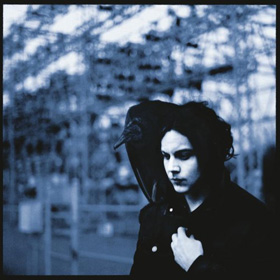Blunderbuss by Jack White

5/5
Blunderbuss: noun
1. a short musket of wide bore with expanded muzzle to scatter shot, bullets, or slugs at close range.
2. an insensitive, blundering person.
Whether Jack White intended for listeners to consider a firearm or a foolish, unfeeling person in conjunction with his debut solo album, either is ultimately fitting, as explosive energy meets messages about romantic injustice. If you haven’t listened to Jack White since the White Stripes’ 2001 album White Blood Cells, which propelled him along with ex-wife and drummer Meg White to commercial popularity with hits like “Fell in Love with a Girl” and “Dead Leaves and the Dirty Ground,” you’ll find something strikingly different here. With Blunderbuss, White stays unfailingly true to himself as a vocalist while introducing a range of instrumental variation that labels this creation as his and his alone.
Over the past 15 years, Detroit-born White has built a name for himself by helping to establish bands like the Raconteurs in 2005 and the Dead Weather in 2009, all the while running his record label, Third Man, out of Nashville, Tenn. His ever-evolving role as a contributor to modern music parallels the diversity in the album itself.
The tracks on Blunderbuss are just as fiery as the name of the album implies—these are sounds we recognize that have been ignited with new life. For example, the opening track “Missing Pieces” starts the composition off strongly with a piano part that forcefully introduces itself among inspiring guitar riffs. This is the first of several instances in which a juxtaposition of modern yet classically poignant piano makes for a considerably rich auditory experience by highlighting White’s eclectic vocals.
While songs like “Sixteen Saltines” represent a harder garage-punk sound, contrasting tracks such as “Hypocritical” and “Weep Themselves to Sleep” utilize the piano’s classicism to impose a softer edge. The opposition between old and new is evident in “I Guess I should Go to Sleep” and the closing track, “Take Me with You When You Go,” in which an almost ragtime piano intertwines with guitar melodies that are surprising and fresh.
White sings about trite topics—a woman, a love, a loss and the ensuing heartache. However, his lyrics are fresh. On “Freedom at 21” White sings, “She don’t care what kind of wounds she’s inflicted on me / She don’t care what kind of bruises she’s leaving on me,” while on “Weep Themselves to Sleep” he declares, “No one can blow the shows / Or throw the blows that break your nose like I can.” Similarly resentful of a love gone bad, on the album’s first single “Love Interruption,” White, with the help of singer Ruby Amanfu, proclaims, “Yeah I won't let love disrupt, corrupt or interrupt me, anymore.”
The closing track, “Take Me With You When You Go,” employs layered vocals and a gradual increase in pace that does its job of maintaining the listener’s interest. Like the rest of the tracks on Blunderbuss, its multi-dimensionality is refreshing and makes for a collection of sound that is distinct among contemporary American music. It remains climactic up until the last few seconds, providing a closing to an album that is persistently unpredictable.
With songs that are succinct in length but inundated with innovation, Blunderbuss is one that will leave a lasting impression. Written, recorded and produced entirely by White, the album is an example of personal creative material that he couldn’t have expressed better any other way. As his solo career begins to flourish, Blunderbuss exists in the wake of a bass-less set of tracks that made Jack White a familiar name, but it is certainly not off base.
Release Date: April 24, 2012
Label: Third Man Records
Stars: 5 out of 5
RELATED ARTICLES
Get the most-revealing celebrity conversations with the uInterview podcast!





Leave a comment